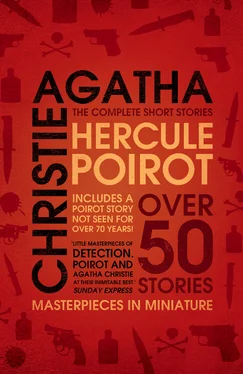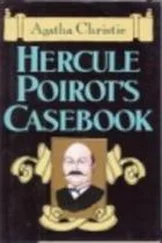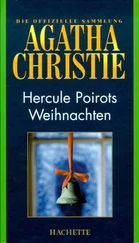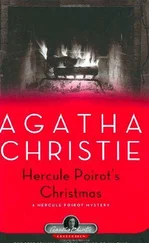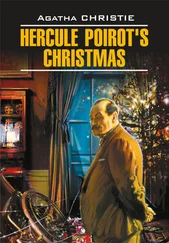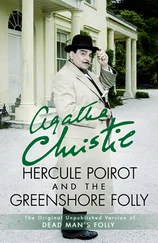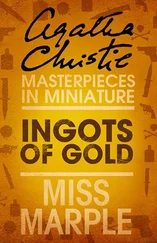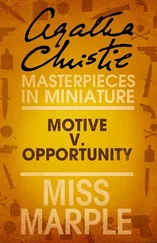Agatha Christie
Hercule
Poirot

The Complete
Short Stories

HarperCollins Publishers Ltd. 1 London Bridge Street London SE1 9GF
www.harpercollins.co.uk
Copyright © 1999 Agatha Christie Ltd.
Agatha Christie asserts the moral right to be identified as the author of this work
A catalogue record for this book is available from the British Library
All rights reserved under International and Pan-American Copyright Conventions. By payment of the required fees, you have been granted the nonexclusive, nontransferable right to access and read the text of this ebook on-screen. No part of this text may be reproduced, transmitted, downloaded, decompiled, reverse engineered, or stored in or introduced into any information storage and retrieval system, in any form or by any means, whether electronic or mechanical, now known or hereinafter invented, without the express written permission of HarperCollins ebooks
HarperCollins Publishers has made every reasonable effort to ensure that any picture content and written content in this ebook has been included or removed in accordance with the contractual and technological constraints in operation at the time of publication
Source ISBN: 9780006513773
Ebook Edition © JULY 2011 ISBN 9780007438969
Version: 2018-11-05
Cover
Title Page
Copyright
Introduction : Enter Hercule Poirot
1. The Affair at the Victory Ball
2. The Jewel Robbery at the Grand Metropolitan
3. The King of Clubs
4. The Disappearance of Mr Davenheim
5. The Plymouth Express
6. The Adventure of the Western Star
7. The Tragedy at Marsdon Manor
8. The Kidnapped Prime Minister
9. The Million Dollar Bond Robbery
10. The Adventure of the Cheap Flat
11. The Mystery of Hunter’s Lodge
12. The Chocolate Box
13. The Adventure of the Egyptian Tomb
14. The Veiled Lady
15. The Adventure of Johnnie Waverly
16. The Market Basing Mystery
17. The Adventure of the Italian Nobleman
18. The Case of the Missing Will
19. The Incredible Theft
20. The Adventure of the Clapham Cook
21. The Lost Mine
22. The Cornish Mystery
23. The Double Clue
24. The Adventure of the Christmas Pudding
25. The Lemesurier Inheritance
26. The Under Dog
27. Double Sin
28. Wasps’ Nest
29. The Third-Floor Flat
30. The Mystery of the Spanish Chest
31. Dead Man’s Mirror
32. How Does Your Garden Grow?
33. Problem at Sea
34. Triangle at Rhodes
35. Murder in the Mews
36. Yellow Iris
37. The Dream
38. Four-and-Twenty Blackbirds
39. The Labours of Hercules – Foreword
40. The Nemean Lion
41. The Lernean Hydra
42. The Arcadian Deer
43. The Erymanthian Boar
44. The Augean Stables
45. The Stymphalean Birds
46. The Cretan Bull
47. The Horses of Diomedes
48. The Girdle of Hyppolita
49. The Flock of Geryon
50. The Apples of the Hesperides
51. The Capture of Cerberus
Postscript : Poirot and the Regatta Mystery
Keep Reading
Appendix : Short Story Chronology
Also in this Series: Agatha Christie
Poirot in the Orient
Poirot: The French Collection
Poirot: The War Years
Poirot: The Complete Battles of Hastings: Volume 1
Poirot: The Complete Battles of Hastings: Volume 2
Miss Marple Omnibus: Volume I
Miss Marple Omnibus: Volume II
Miss Marple Omnibus: Volume III
Also Available: Agatha Christie
The Mary Westmacott Collection: Volume One
The Mary Westmacott Collection: Volume Two
Also in this Series: Agatha Christie
The Complete Quin & Satterthwaite Love Detectives
Also Available: Agatha Christie
Come, Tell Me How You Live
About the Author
Also by the Author
About the Publisher

Introduction Enter Hercule Poirot
Who could I have as a detective? I reviewed such detectives as I had met and admired in books. There was Sherlock Holmes, the one and only – I should never be able to emulate him . There was Arsene Lupin – was he a criminal or a detective? Anyway, not my kind. There was the young journalist Rouletabille in The Mystery of the Yellow Room – that was the sort of person whom I would like to invent: someone who hadn’t been used before. Who could I have? A schoolboy? Rather difficult. A scientist? What did I know of scientists? Then I remembered our Belgian refugees. We had quite a colony of Belgian refugees living in the parish of Tor. Why not make my detective a Belgian? I thought. There were all types of refugees. How about a refugee police officer? A retired police officer. Not too young a one. What a mistake I made there. The result is that my fictional detective must really be well over a hundred by now.
Anyway, I settled on a Belgian detective. I allowed him slowly to grow into his part. He should have been an inspector, so that he would have a certain knowledge of crime. He would be meticulous, very tidy, I thought to myself, as I cleared away a good many untidy odds and ends in my own bedroom. A tidy little man. I could see him as a tidy little man, always arranging things, liking things in pairs, liking things square instead of round. And he should be very brainy – he should have little grey cells of the mind – that was a good phrase: I must remember that – yes, he would have little grey cells. He would have rather a grand name – one of those names that Sherlock Holmes and his family had. Who was it his brother had been? Mycroft Holmes.
How about calling my little man Hercules? He would be a small man – Hercules: a good name. His last name was more difficult. I don’t know why I settled on the name Poirot, whether it just came into my head or whether I saw it in some newspaper or written on something – anyway it came. It went well not with Hercules but Hercule – Hercule Poirot. That was all right – settled, thank goodness.
Hercule Poirot had been quite a success in The Mysterious Affair at Styles , so it was suggested that I should continue to employ him. One of the people who liked Poirot was Bruce Ingram, editor at the time of The Sketch . He got in touch with me, and suggested that I should write a series of Poirot stories for The Sketch . This excited me very much indeed. At last I was becoming a success. To be in The Sketch – wonderful! He also had a fancy drawing made of Hercule Poirot which was not unlike my idea of him, though he was depicted as a little smarter and more aristocratic than I had envisaged him. Bruce Ingram wanted a series of twelve stories. I produced eight before long, and at first it was thought that that would be enough, but in the end it was decided to increase them to twelve, and I had to write another four rather more hastily than I wanted.
It had escaped my notice that not only was I now tied to the detective story, I was also tied to two people: Hercule Poirot and his Watson, Captain Hastings. I quite enjoyed Captain Hastings. He was a stereotyped creation, but he and Poirot represented my idea of a detective team. I was still writing in the Sherlock Holmes tradition – eccentric detective, stooge assistant, with a Lestrade-type Scotland Yard detective, Inspector Japp.
Читать дальше
